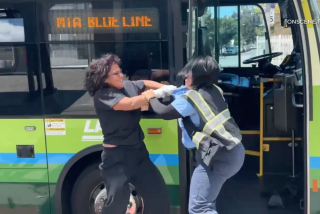Bus Riders React With Sympathy, Resentment
- Share via
Let the bus riders be heard:
They are students, immigrants and working-class folks. Many are senior citizens. Most find it tough to fork over $42 for their monthly passes even though the Metropolitan Transportation Authority’s buses and trains often are their only reliable means of getting around.
When transit strikes are threatened, bus riders often are depicted as powerless victims, not involved citizens with opinions.
But Thursday, in a random sampling of a dozen or so riders between downtown and the Crenshaw district, there was no shortage of views about the MTA deadline, then just hours away.
At the heart of the matter were issues to which the passengers said they could relate: pay cuts, long hours and what they see as the prioritizing of profits over workers.
“The MTA, they got all the money and they don’t want to cough up nothing,” said Florine Grandberry, 47, a rider in a wheelchair who called her bus driver on Line 42 “my best friend.” She rides the line eight hours a day to get out of the house, she said.
Jimel Barnes, a filmmaker, said of MTA management: “They’re hurting people who really need transportation. To me, they’re being greedy and selfish.”
As the bus crept south along Broadway downtown, grandmothers lugged grocery bags aboard. Passengers juggled babies and schoolbooks to find correct change for the $1.35 fare ($1.60 with a transfer). Some passed the time distracted by books, friends and stereo headphones.
“I don’t know much about the strike,” admitted Melika Patterson, 26, a nursing student at Los Angeles Trade-Technical College, “but I know people are overworked in America. If I was a driver, I would be on strike.”
Patterson and others said they often see the effects of drivers’ long hours, though work schedules vary greatly throughout the MTA: Many drivers are cranky and impatient, the passengers said. Two reported seeing drivers nod off at red lights.
“One driver over on Crenshaw was just sitting there for a while,” said a woman at a bus stop who works for the county correctional services and declined to give her name. “The light was turning red, then green, then red. We had to wake him up!”
Waiting downtown for Line 45, Tomiko Cash, 24, complained that drivers sometimes fail to stop for waiting passengers and are rude to those who make it aboard. Still, she supported them, saying, “Maybe if the drivers win this battle, they’ll act more humane to us.”
On Line 40 headed downtown from Martin Luther King Boulevard and Western Avenue, where most riders were African American and a handful were Latino, few were without opinions on a strike.
Fred Coleman, 46, was headed to Union Station for his job at Amtrak. He played a hand-held video game and described himself as “very much pro-worker, being a member of a union myself.”
Beside him sat Richard Pittman, 34, an unemployed computer student who was staunchly anti-union. He said the union that represents the MTA’s 6,800 drivers, mechanics, train operators and clerks should be most concerned with him, a paying customer, not the minutia of their work contract.
“I’m not down with this,” he said. “This is a service everyone needs. . . . Everyone has problems at their jobs. What are we going to do if we get out of our jobs because [we can’t get there]?”
For the next 15 minutes, Coleman and Pittman discussed the state of the country’s unions while other passengers craned their necks to listen and chime in.
At the heart of their disagreement: whether unions truly represent the grass roots (Coleman said they do) or are merely another arm of rich, top-heavy corporate America (Pittman’s view).
When Pittman gathered his bags and alighted at Broadway and 4th Street, he shook hands with the others and thanked them for helping him decide on a good topic for his next term paper.
But, after he was gone, Coleman and another passenger, a state worker and union member whose uniform identified him as Ed, got in the final word.
“Unions are the heart of this country,” Coleman said, “whether that brother has that information or not.”
More to Read
Sign up for Essential California
The most important California stories and recommendations in your inbox every morning.
You may occasionally receive promotional content from the Los Angeles Times.










